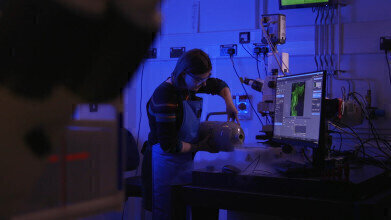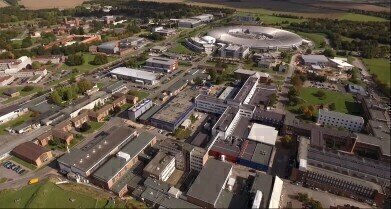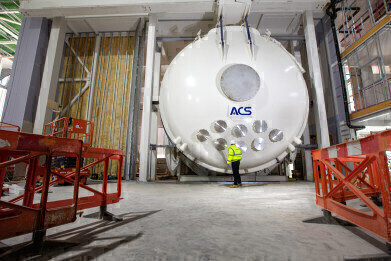-
 Scientists in CLF's Octopus imaging cluster
Scientists in CLF's Octopus imaging cluster -
 Rutherford Appleton Laboratory with Diamond Light Source behind
Rutherford Appleton Laboratory with Diamond Light Source behind -
 Large Space Test Chamber - RAL Space
Large Space Test Chamber - RAL Space
News
Funding Boost for Oxfordshire Science Laboratories
Jan 07 2021
The UK Government has allocated up to £8million in laboratory upgrades and a further £13million in science campus improvements at the Science and Technology Facilities Council’s (STFC) Rutherford Appleton Laboratory (RAL) based near Didcot. The funding is part of a major £213 million government investment programme announced on January 6 for upgrading the UK’s scientific infrastructure.
The investment at RAL includes £1 million for a Strontium Source Laboratory to allow work on cold-atom sensors and instruments. This will support work on quantum projects recently recognised as a future priority infrastructure for the UK and act as a local testing ground for larger-scale devices to be delivered by RAL departments.
Dr Neil Geddes, STFC Director of National Laboratories, said: “This investment will push forward research across a wide range of science and technology projects, reflecting the breadth of the work undertaken at RAL. It further strengthens the Laboratories’ key role at the heart of the Harwell Science and Innovation Campus.”
£3 million will also update precision machining equipment to support a wide range of science and technology programmes ranging from quantum sensors to components for space satellites.
Other investments at RAL include:
£140,000 to the Deuterium-Deuterium neutron source alongside the already-planned Deuterium-Tritium source at ISIS Neutron and Muon Source to support work on dark matter detection, dosimetry and solid state neutron detection.
• £900,000 in high performance computing infrastructure to support the data analysis from the UK’s large multidisciplinary facilities, the ISIS Neutron and Muon Source, the Diamond Light Source and the Central Laser Facility.
• £500,000 towards the completion of the thermal vacuum satellite test chambers in STFC’s RAL Space, to support the test and calibration of larger space flight instruments for both industrial and academic customers.
• £470,000 for an imaging capability for fast freezing to support bio-science experiments at cryogenic temperatures on the OCTOPUS imaging cluster at the Central Laser Facility.
These new facilities will ensure that STFC’s Didcot-based campus will remain at the forefront of global research and show the UK is the best place in the world for scientists, researchers and entrepreneurs to live and work.
Professor Marisa Martin-Fernandez, Octopus Group Leader, Central Laser Facility, STFC, said: “Using a combination of microscopy techniques enables us to understand much more about biological systems. The Harwell campus is contributing to the UK’s efforts in this area by bringing together the world class imaging facilities at the Central Laser Facility and Diamond/eBIC. The imaging system to support rapid freezing sample preparation will enable us to stop biological processes at critical stages before imaging the samples with multiple microscopy techniques. This will provide new insights into the workings of human cells in health and disease.”
The funding also includes up to £13 million investment in the wider Harwell science campus including support on improved environmental sustainability, setting up of more electric car charging ports, the installation of solar panels, and improved site landscaping and welfare facilities.
Digital Edition
Lab Asia Dec 2025
December 2025
Chromatography Articles- Cutting-edge sample preparation tools help laboratories to stay ahead of the curveMass Spectrometry & Spectroscopy Articles- Unlocking the complexity of metabolomics: Pushi...
View all digital editions
Events
Jan 21 2026 Tokyo, Japan
Jan 28 2026 Tokyo, Japan
Jan 29 2026 New Delhi, India
Feb 07 2026 Boston, MA, USA
Asia Pharma Expo/Asia Lab Expo
Feb 12 2026 Dhaka, Bangladesh


















